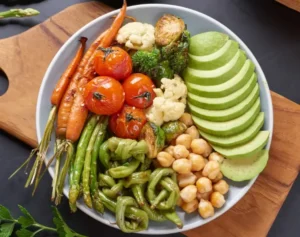
photo credit to freepik.com
The benefits of a plant-based diet extend beyond specific age groups. Plant-based eating can be beneficial for individuals at every life stage, from infancy to older adulthood. By providing a wide range of essential nutrients and promoting overall well-being, a plant-based diet offers a sustainable and healthful approach to nutrition. In this article, we explore how a plant-based diet can be tailored to meet the unique needs of different life stages, ensuring optimal health and vitality.
1. Plant-Based Diets During Pregnancy and Lactation
A well-planned plant-based diet can provide all the necessary nutrients for a healthy pregnancy and lactation. It is crucial for pregnant and breastfeeding individuals to consume adequate amounts of protein, iron, calcium, folate, and omega-3 fatty acids. Plant-based protein sources such as legumes, tofu, tempeh, and quinoa, along with fortified plant-based milk alternatives, can meet protein needs. Iron-rich foods like leafy greens, lentils, and fortified cereals aid in preventing iron deficiency anemia. Calcium requirements can be met through plant-based sources such as fortified plant-based milk, calcium-set tofu, and leafy greens. Ensuring adequate intake of prenatal vitamins, including folic acid, is essential.
2. Plant-Based Nutrition for Infants, Children, and Teenagers
Plant-based nutrition can be safe and nutritious for infants, children, and teenagers, when properly planned and monitored. Breastfeeding is recommended for the first six months, providing essential nutrients for infants. For older infants and children, a variety of plant-based foods can be introduced gradually, including mashed fruits, cooked vegetables, whole grains, and legumes. Key nutrients of concern include iron, vitamin B12, vitamin D, and omega-3 fatty acids. Fortified cereals, legumes, and plant-based milk alternatives can supply iron and vitamin B12. Vitamin D can be obtained through sunlight exposure or supplements. Omega-3 fatty acids can be sourced from ground flaxseeds, chia seeds, and walnuts.
3. Plant-Based Diets for Athletes and Active Individuals
Plant-based diets can support the energy demands of athletes and active individuals, providing adequate protein, carbohydrates, and nutrients for performance and recovery. High-quality plant protein sources, such as soy, quinoa, hemp seeds, and legumes, can meet protein needs. Carbohydrates from whole grains, fruits, and starchy vegetables serve as fuel for physical activity. Adequate intake of iron, calcium, zinc, and vitamin D is crucial for athletes, and plant-based sources like leafy greens, fortified plant-based milk alternatives, nuts, and seeds can fulfill these requirements. Careful meal planning and consideration of individual needs are essential for optimizing athletic performance.
4. Plant-Based Diets for Older Adults
A plant-based diet can offer numerous health benefits for older adults, including improved cardiovascular health, cognitive function, and management of chronic diseases. Adequate intake of protein, calcium, vitamin D, vitamin B12, and omega-3 fatty acids is crucial for older adults. Plant-based protein sources such as legumes, tofu, tempeh, and seitan can support muscle mass and strength. Calcium-set tofu, fortified plant-based milk alternatives, and leafy greens supply calcium. Vitamin D can be obtained through sunlight exposure or supplements. Fortified foods and supplements are essential sources of vitamin B12. Omega-3 fatty acids can be obtained from flaxseeds, chia seeds, walnuts, and algae-derived supplements.
Conclusion
A plant-based diet can be customized to meet the nutritional needs of individuals at every life stage, supporting optimal health and well-being. From pregnancy and infancy to childhood, adolescence, athletic
If you want to try a plant-based diet and are committed to improving your health, go to the Mi Vida Inner Health clinic in Stockport, Manchester. A skilled nutritionist who works at the clinic can help you with your needs. You can schedule a consultation by calling 0161 243 5969 or emailing info@mividainnerhealt-ry0jysbts.live-website.com.
*Bonus* A practical guide to travelling as a Vegan or with other dietary requirements
The comprehensive guide covers:
- How to travel as a vegan – including tips on researching trips, knowing about destinations, and helpful phrases for ordering vegan food abroad.
- Advice on vegan-friendly travel apps and websites to help you plan where to eat and common mistakes to avoid as a vegan traveller.
- Other useful links and resources for travellers about planning a holiday as a vegan.





